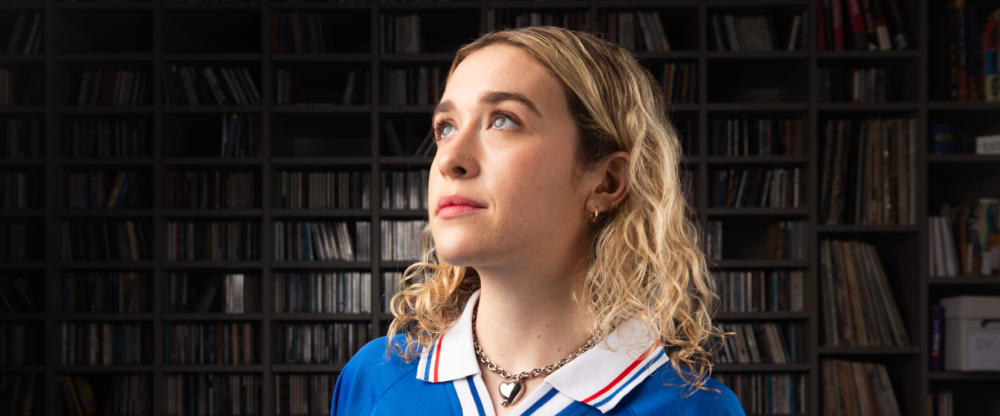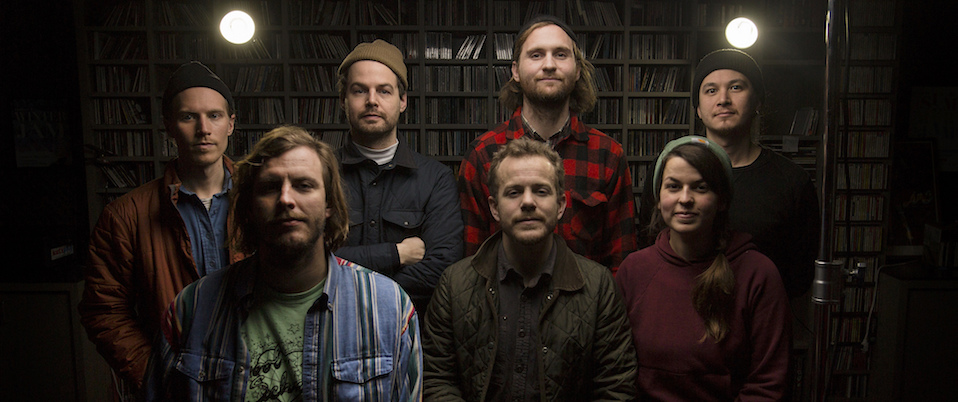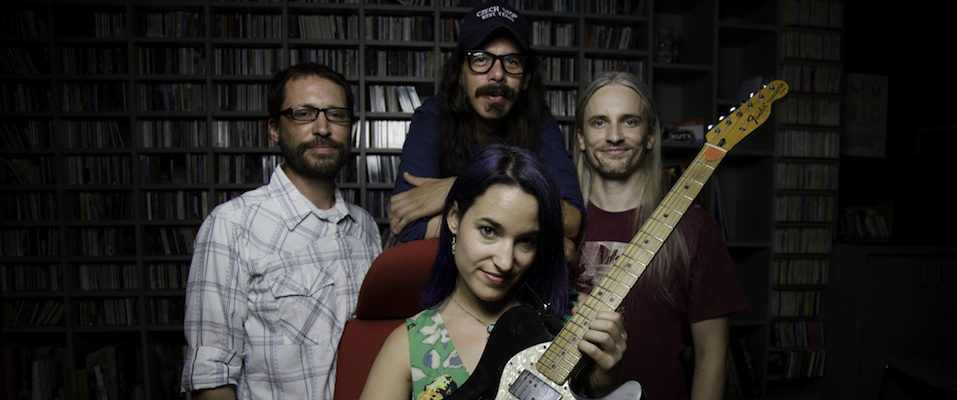By Jeff McCord
Sabrina Teitelbaum finds her voice
“People can tell when you’re being yourself, even if they’re not thinking about it. I think they can tell. And I wasn’t being myself with the last project, I just didn’t really know who I was.”
Straight to the point. Direct. That’s Sabrina Teitelbaum, known these days to music fans as Blondshell. She just passed through Austin as the support act for Liz Phair, and I caught up with her the next day right after her Studio 1a session. With no show on the books that night, and only a few left on the tour, she’s relaxed and acting like someone with nothing to hide.
Raised in Manhattan by a single, music-loving dad, Sabrina grew up as a rabid Stones fan, soaking in New York’s music offerings.
“There were a lot of indie rock bands that I listened to and would go see live,” she tells me. “I was always going to Terminal 5 and seeing shows there, the indie rock scene in 2015; that was a big part of it. There was also this group of singer-songwriters that were coming up at the time, Lorde and Lana Del Rey, and the lyrics were dark, but they were these pop singers. I was really fascinated by that, I loved them. Lorde’s album, Pure Heroine, came out when I was in high school and she was my age. I was inspired by the fact that she was my age and was really good and writing these amazing songs.”
“You thought, ‘I could do this’?” I ask her.
“Kind of. Also, ‘Oh God, I’m so behind.’”
There was never any doubt. Sabrina always wanted to be a musician. Once out of high school, she left for LA, to attend USC’s Thornton School of Music.
“I needed to figure out how to sing harmonies and how to talk about music in a way that other people would understand. If you’re going into a session, there’s a language you need to know.”
She stuck school out a couple of years before launching BAUM, her pop-infused recording project, releasing songs aimed at broken relationships infused with remorse, and culminating in the viral “Fuckboy” kiss-off single, a retaliatory strike of her own casual sex. One critic called her the “Queer Jewish Princess of Dark Pop”. (Titlebaum is bi-sexual).
But if outwardly, it looked like success, inwardly things were a mess. Sabrina struggled with the loss of a parent, a breakup, and her problems with drugs and alcohol. Sabrina withdrew and worked to get sober. Then came the pandemic, and in crept doubt.
“I wasn’t super sure of anything with the last project. Part of that is just because I was younger and when I started to spend more time by myself, that kind of coincided with the pandemic. So it’s hard to say, what’s the pandemic and what’s just [the fact] I was getting older. There were a lot of changes around the time, but the world kind of being on pause for a second allowed me a lot of space to work through it. I was like, ‘Oh, this is bad because now I want to change my whole project and I don’t want to do the other type of music. I want to do this new thing.’ So it was it was a lot of things that came together.”
The song that came first was “Olympus”, and to Sabrina, it felt like the beginning of a new chapter. It was stark, aching. “I wanna save myself,” she cries. “You’re part of my addiction.”
She wasn’t sure what this was, but it sure wasn’t pop music. Could she do this? Turn her back on BAUM and start over? It seemed both terrifying and exciting.
She sent “Olympus” to her her producer and friend, Yves Rothman.
“I think he heard what the songs could be. I would send him voice memos from my phone, so that wasn’t like a full production. And he knew what the songs had, how to bring them to life more in terms of the production. There was a lot that he showed me. I think he just understood where I was coming from and what I wanted my project to sound like.”
So Blondshell was born. The songs, full of conflict, hurt, anger – were built around solid, almost classic rock framings. Sabrina holds little back, confessing her involvement in bad relationships, and the constant pull of her former bad habits. She compares one toxic lover to “Sepsis”. “It should take a whole lot less/to turn me off”. In “Kiss City”, she longs for something she sees elsewhere but can’t seem to reach herself – intimacy. “I’m adjacent to a lot of love.”
I saw Blondshell perform early at SXSW, yet months later, opening for Liz Phair, her show is a revelation. Sabrina commands the stage, while the band lays down foundational rock with real muscle. Her aches and rages are there for all to hear, but they’re competing with real melody and structure. She’s laying it all out there, but it’s up to you how deep you want to dig.
Such bracing honesty is rare in any kind of music. But Sabrina knows no other path. She’s just being herself.
About to stare at the empty white page as she begins to write album two, I wonder if she will keep confessing to audiences to the degree she has.
“Yeah,” she says without hesitation. “It’s weird in front of people I know, like friends, family, whatever, you want to have certain boundaries. I wasn’t really hiding anything, so that can be interesting. But with strangers, it’s fine, you know, It’s just kind of fun.”
FOLLOW BLONDSHELL
Musicians: Sabrina Teitelbaum – vocals; Jeff Franton – guitar; Charlie Ellis – bass; Anna Crane – drums
Credits:
Producer: Deidre Gott; Production Assistant: Confucius Jones; Audio Engineer: Jake Perlman, Rayna Sevilla; Audio Mix: Jake Perlman; Cameras: Nastassja Collak, Michael Minasi; Edit: Michael Minasi; Host: Fresh Knight



